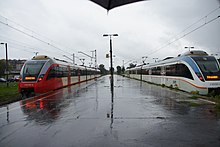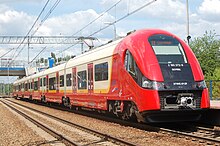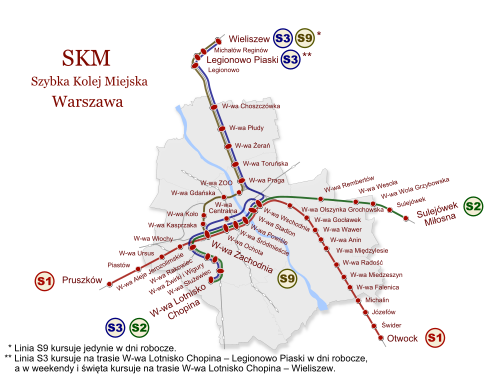Szybka Kolej Miejska (Warsaw)
 | |
 | |
| Type | Ltd. |
|---|---|
| Industry | Rail transport |
| Founded | February 5, 2004 |
| Headquarters | Warsaw, Poland |
Area served | Warsaw metropolitan area |
Key people | CEO |
| Owner | City of Warsaw |
| Website | www |
Szybka Kolej Miejska (SKM) (literally in English Fast City Rail) is a rail operator providing services in the Warsaw metropolitan area using the national rail network while constituting a part of the city's integrated public transport system organized by the Warsaw Transport Authority.
History[]
The Warsaw SKM in its present form was initially proposed in 2002, stipulating to use the existing infrastructure of the Warsaw Railway Junction, especially the cross city line with its over 2 km long tunnel running under the city center and conveniently located underground station, as a cheap substitute for a badly needed second metro line.



In order to implement this the Mayor of Warsaw Lech Kaczyński established in 2004 the municipally-owned company Szybka Kolej Miejska Sp. z o.o. The company was originally incorporated as a joint venture between the City of Warsaw with 50% shares and the companies Metro Warszawskie Sp. z o.o. with 49% shares and Tramwaje Warszawskie Sp. z. o.o. with 1% shares, both owned entirely by the city and responsible respectively for the Metro and Tram system. As such the company was notably completely independent from the national rail operator PKP Group, unlike Koleje Mazowieckie established by the Masovian Voivodship at around the same time.
The newly formed company was equipped with six Newag 14WE EMUs which were extensive modernizations of the PKP class EN57 EMUs, with a modern looking body but retaining the old mechanical components.
A year and a half after being established the SKM initiated its operation with its first trains, opening a line from Warszawa Zachodnia along the cross city line to Warszawa Wschodnia and along the Vistula river to . The new service failed to deliver on its promise to serve as a viable replacement due to the poor state of the rail infrastructure. Passengers within the city center preferred the more accessible trams system and few people wanted to use the trains in the southeastern districts of the city. Additionally, while the integrated fare system of the Warsaw Transit Authority offered a large convenience the modern look and relative cleanness of the rolling stock sharply contrasted with the standard found in the Polish railroad, during rush hours most of the slots on the tracks were taken up by regional traffic and the new EMUs suffered from the same technical problems as the ones they were based on.
Due to the initial low popularity of the line the original concept was somewhat altered in 2006 with the line extended outside the administrative borders of the city through the Ursus district into the town of Pruszków to the west and diverted to the district of the Wesoła and the town of Sulejówek to the east, turning the service into a suburban commuter train which allowed people in the metropolitan area to quickly reach the city center and conveniently transfer within the city's public transit system. The revised formula proved to be very successful leading the city to take the purchase of all the shares of the company and purchase two more Newag 14WE EMUs. The popularity of trains run the SKM was also instrumental in the city negotiating a deal with the Masovian Voivodship to have Koleje Mazowieckie honour long term tickets of the Warsaw Transit Authority, first along the route of the SKM and eventually within the entire area served by the city's public transit system.
In 2010 the company purchased four brand new EMUs and opened a new line to the town of Otwock. Additionally, the Warsaw Transit Authority signed a contract with the Koleje Mazowieckie to operate a line between station on the Warsaw Circumferential Line and the town of Legionowo under the branding of the SKM, and since 2012 taken over by the company.
In 2011 13 new PESA 27WE 'ELF' EMUs (2011–2012) were purchased. In 2012 a new connection was created running through the Służewiec office district and a newly opened 1.5 km rail tunnel to the Warsaw Chopin Airport.
In 2012 the company purchased 9 Newag 35WE units.[1]
In 2020 SKM has awarded Newag a contract to supply 21 EMUs. New trains will feature air-conditioning, a passenger information system, ticket vending machines and validators, Wi-Fi, USB sockets and an AED defibrillator.[2]
In January 2022 Newag has delivered the first two Impuls 2 EMUs [3]
Rolling stock[]
| Image | Type | Number | Description |
|---|---|---|---|
| Newag 14WE | 6 units | Introduced in 2005. The first six units were purchased with the creation of the company. Rebuilt from old PKP class EN57 and extensively modernized giving them a modern look and making them more suitable for carrying large numbers of passengers on shorter routes within the Warsaw metropolitan area. Two units out of eight originally ordered have been sold to Koleje Śląskie. | |

|
4 units | Introduced in 2010. New EMUs designed and built for the SKM | |

|
PESA 'ELF' 27WE | 13 units | Introduced in 2011. A version of the PESA ELF EMU adapted for the SKM |

|
Newag 35WE | 6 units | Introduced in 2012. |
Lines[]

Line S1 (Otwock – Warszawa Śródmieście – Pruszków)[]
The line was established in October 2005, running from to Warszawa Zachodnia and suspended indefinitely in July 2006 with all of the rolling stock directed to the newly created line S2. In September 2010 the line was re-established and extended towards the town of Otwock, south east of Warsaw, but only reaching Warszawa Wschodnia, which required most of the potential passengers to transfer there to trains running on the line S2 or regional trains operated by Koleje Mazowieckie to reach the city. The line was extended through Warszawa Śródmieście and Warszawa Zachodnia to Pruszków in December 2010.
| Station | District/Town |
|---|---|
| Otwock | Otwock |
| Świder | Otwock |
| Józefów | Józefów |
| Michalin | Józefów |
| Warszawa Falenica | Warszawa Wawer |
| Warszawa Miedzeszyn | Warszawa Wawer |
| Warszawa Radość | Warszawa Wawer |
| Warszawa Międzylesie | Warszawa Wawer |
| Warszawa Anin | Warszawa Wawer |
| Warszawa Wawer | Warszawa Wawer |
| Warszawa Gocławek | Warszawa Wawer |
| Warszawa Olszynka Grochowska | Warszawa Praga Południe |
| Warszawa Wschodnia | Warszawa Praga Północ |
| Warszawa Stadion | Warszawa Praga Południe |
| Warszawa Powiśle | Warszawa Śródmieście |
| Warszawa Śródmieście | Warszawa Śródmieście |
| Warszawa Ochota | Warszawa Ochota |
| Warszawa Zachodnia | Warszawa Ochota |
| Warszawa Włochy | Warszawa Włochy |
| Warszawa Ursus | Warszawa Ursus |
| Warszawa Ursus Niedźwiadek | Warszawa Ursus |
| Piastów | Piastów |
| Pruszków | Pruszków |
Line S2 (Warsaw Chopin Airport – Warszawa Śródmieście – Sulejówek)[]
The line was established in July 2006 running from Pruszków through Warszawa Śródmieście to . In December 2010 the line was shortened to Warszawa Zachodnia in the West, with the line S1 taking over the route from Pruszków to Warszawa Zachodnia and further to Warszawa Śródmieście. In June 2012 the line was extended from Warszawa Zachodnia through the Służewiec office district and a newly opened rail tunnel to and underground station at the Warsaw Frédéric Chopin Airport.
| Station | District/Town |
|---|---|
| Warszawa Lotnisko Chopina | Warszawa Włochy |
| Warszawa Służewiec | Warszawa Mokotów |
| Warszawa Żwirki i Wigury | Warszawa Ochota |
| Warszawa Rakowiec | Warszawa Ochota |
| Warszawa Aleje Jerozolimskie | Warszawa Ochota |
| Warszawa Zachodnia | Warszawa Ochota |
| Warszawa Ochota | Warszawa Ochota |
| Warszawa Śródmieście | Warszawa Śródmieście |
| Warszawa Powiśle | Warszawa Śródmieście |
| Warszawa Stadion | Warszawa Praga Południe |
| Warszawa Wschodnia | Warszawa Praga Północ |
| Warszawa Rembertów | Warszawa Rembertów |
| Warszawa Wesoła | Warszawa Wesoła |
| Warszawa Wola Grzybowska | Warszawa Wesoła |
| Sulejówek | |
| Sulejówek |
Line S3 (Warsaw Chopin Airport – Warszawa Śródmieście / Warszawa Centralna – Legionowo)[]
The line was established in June 2012 connecting the Warsaw Frédéric Chopin Airport through the city center with the town of Legionowo north east of Warsaw. The line goes through the Warszawa Centralna railway station which usually serves long-distance trains..
| Station | District/Town |
|---|---|
| Warszawa Lotnisko Chopina | Warszawa Włochy |
| Warszawa Służewiec | Warszawa Mokotów |
| Warszawa Żwirki i Wigury | Warszawa Ochota |
| Warszawa Rakowiec | Warszawa Ochota |
| Warszawa Aleje Jerozolimskie | Warszawa Ochota |
| Warszawa Zachodnia | Warszawa Ochota |
| Warszawa Centralna | Warszawa Śródmieście |
| Warszawa Wschodnia | Warszawa Praga Północ |
| Warszawa Praga | Warszawa Targówek |
| Warszawa Toruńska | Warszawa Targówek/Białołęka |
| Warszawa Żerań | Warszawa Białołęka |
| Warszawa Płudy | Warszawa Białołęka |
| Warszawa Choszczówka | Warszawa Białołęka |
| Legionowo | Legionowo |
| Legionowo Piaski | Legionowo |
Line S9 (Warszawa Zachodnia – Legionowo)[]
The line was established in March 2010, running between Warszawa Gdańska and Legionowo with some trains reaching Wieliszew. It was initially operated by Koleje Mazowieckie and, from 5 September 2011, gradually taken over by SKM. Since December 2011 the line is fully operated by SKM. From 1 September 2012, the line will extend from Warszawa Gdańska to Platform 8 of Warszawa Zachodnia.
| Station | District/Town |
|---|---|
| Warszawa Zachodnia | Warszawa Wola Warszawa Ochota |
| Warszawa Kasprzaka | Warszawa Wola |
| Warszawa Koło | Warszawa Wola |
| Warszawa Gdańska | Warszawa Śródmieście |
| Warszawa ZOO | Warszawa Praga Północ |
| Warszawa Praga | Warszawa Targówek |
| Warszawa Toruńska | Warszawa Targówek/Białołęka |
| Warszawa Żerań | Warszawa Białołęka |
| Warszawa Płudy | Warszawa Białołęka |
| Warszawa Choszczówka | Warszawa Białołęka |
| Legionowo | Legionowo |
| Legionowo Piaski | Legionowo |
| Michałów Reginów | Michałów-Reginów |
| Wieliszew | Wieliszew Kolonia |
References[]
- (in Polish) Official site
External links[]
| Wikimedia Commons has media related to Warszawska Szybka Kolej Miejska. |
- Railway companies of Poland
- Public transport in Poland
- Rapid transit in Poland
- Transport in Warsaw
- Companies based in Warsaw
- Railway companies established in 2004
- Polish companies established in 2004
